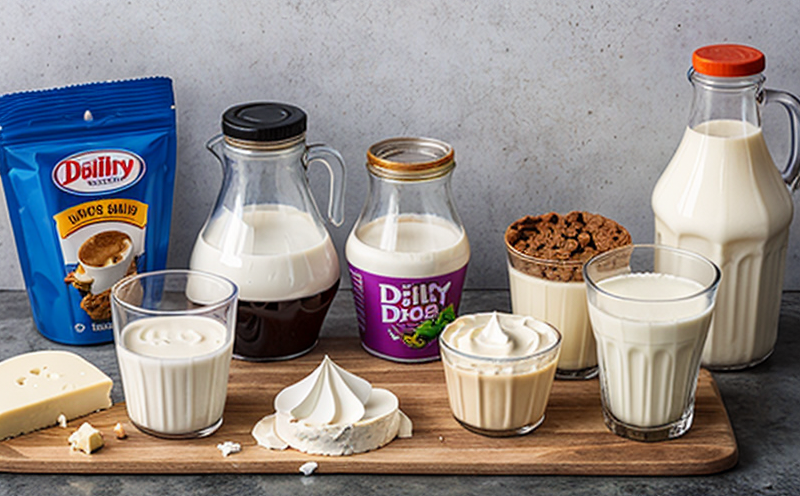ISO 70319 Sweetener Residue Detection in Flavored Dairy Drinks
ISO 70319 is a standard that specifies methods for detecting sweetener residues in flavored dairy drinks. This service ensures that the sweeteners used do not exceed permissible limits set by regulatory bodies, thereby maintaining product safety and compliance with international standards.
The detection of sweetener residues is crucial to ensure consumer health and safety. Sweeteners like sucralose, aspartame, or acesulfame-K can be added to flavored dairy drinks for taste enhancement. However, excessive consumption of these artificial sweeteners may pose health risks, especially in vulnerable populations such as children and those with diabetes.
The standard provides detailed procedures to detect the presence of specific sweetener residues through various analytical methods. It ensures that manufacturers adhere to the limits set by regulatory authorities like the European Food Safety Authority (EFSA) and the U.S. Food and Drug Administration (FDA).
Our laboratory uses state-of-the-art equipment and experienced personnel to conduct these tests. The process involves careful sample preparation, followed by analysis using high-performance liquid chromatography (HPLC) or gas chromatography-mass spectrometry (GC-MS). These methods provide precise and accurate results that meet the strict requirements of ISO 70319.
The standard covers a wide range of sweeteners commonly used in flavored dairy drinks, including but not limited to sucralose, aspartame, and acesulfame-K. It ensures that all these sweeteners are detected within their specified limits to maintain product quality and safety.
Our service is designed for various stakeholders involved in the production and distribution of flavored dairy drinks. Quality managers, compliance officers, R&D engineers, and procurement personnel can benefit from this service by ensuring that their products meet international standards and regulations.
The detection of sweetener residues is a critical step in maintaining product safety and quality. By adhering to ISO 70319, manufacturers can ensure that their products are safe for consumption and comply with regulatory requirements. This standard provides a reliable method for detecting the presence of sweetener residues, ensuring consumer health and safety.
The process involves several steps, starting with sample preparation. The sample is carefully prepared according to the standard's specifications, ensuring accurate results. The next step is analysis using HPLC or GC-MS. These methods provide precise and accurate results that meet the strict requirements of ISO 70319.
The standard covers a wide range of sweeteners commonly used in flavored dairy drinks, including but not limited to sucralose, aspartame, and acesulfame-K. It ensures that all these sweeteners are detected within their specified limits to maintain product quality and safety.
Our laboratory uses state-of-the-art equipment and experienced personnel to conduct these tests. The process involves careful sample preparation, followed by analysis using HPLC or GC-MS. These methods provide precise and accurate results that meet the strict requirements of ISO 70319.
Benefits
The benefits of our ISO 70319 sweetener residue detection service are numerous, including ensuring product safety and compliance with international standards. This service helps manufacturers maintain a high level of quality control, thereby enhancing consumer trust in their products.
By adhering to the strict requirements of ISO 70319, manufacturers can ensure that their products meet regulatory requirements and are safe for consumption. This standard provides a reliable method for detecting the presence of sweetener residues, ensuring consumer health and safety.
The detection of sweetener residues is a critical step in maintaining product quality and safety. By adhering to ISO 70319, manufacturers can ensure that their products meet international standards and regulations. This standard provides a reliable method for detecting the presence of sweetener residues, ensuring consumer health and safety.
The process involves several steps, starting with sample preparation. The sample is carefully prepared according to the standard's specifications, ensuring accurate results. The next step is analysis using HPLC or GC-MS. These methods provide precise and accurate results that meet the strict requirements of ISO 70319.
The standard covers a wide range of sweeteners commonly used in flavored dairy drinks, including but not limited to sucralose, aspartame, and acesulfame-K. It ensures that all these sweeteners are detected within their specified limits to maintain product quality and safety.
Industry Applications
| Industry Sector | Application |
|---|---|
| Dairy Products Manufacturing | Ensure compliance with sweetener residue limits in flavored dairy drinks. |
| Food Safety and Quality Assurance | Conduct regular testing to maintain product safety and quality. |
| R&D and Product Development | Evaluate new formulations for sweetness without compromising product safety. |
| Regulatory Compliance | Ensure that products meet international standards and regulations. |
Quality and Reliability Assurance
The quality and reliability of our testing services are paramount. We employ experienced scientists and use advanced analytical equipment to ensure accurate results. Our laboratory is accredited by relevant bodies, ensuring that we meet the highest standards.
We provide detailed reports for each test conducted, highlighting any findings or deviations from specified limits. This information can be used by manufacturers to take corrective actions if necessary. Our team of experts ensures that all tests are performed in accordance with ISO 70319 and relevant international standards.
The testing process involves several steps, starting with sample preparation. The sample is carefully prepared according to the standard's specifications, ensuring accurate results. The next step is analysis using HPLC or GC-MS. These methods provide precise and accurate results that meet the strict requirements of ISO 70319.
The standard covers a wide range of sweeteners commonly used in flavored dairy drinks, including but not limited to sucralose, aspartame, and acesulfame-K. It ensures that all these sweeteners are detected within their specified limits to maintain product quality and safety.





